Ministry of Finance
Union Minister of Finance and Corporate Affairs Smt. Nirmala Sitharaman launches Goods and Services Tax Appellate Tribunal (GSTAT) in New Delhi, today
GSTAT is result of our determination to continue improving, reforming, and adapting for the future: Union Finance Minister
GSTAT must focus on jargon-free decisions in plain language; simplified formats and checklists; digital-by-default filings and virtual hearings; and time standards for listing, hearing and pronouncement, says FM Smt. Sitharaman.
Outcome of GSTAT must be straightforward with reduced legal frictions, greater simplicity, and proactively addressing delays in litigation to ensure cash flows move faster and MSMEs and exporters invest with confidence and citizens feel benefits of the system: FM Smt. Nirmala Sitharaman
Inspired by the Prime Minister's 'Minimum Government, Maximum Governance,' India had moved towards clarity with targeted initiatives, and technology is at centre of India's reforms journey: MoS Finance
Strong appellate mechanism instils this trust that justice will be swift and fair: MoS Shri Chaudhary
GSTAT to ensure that every taxpayer's appeal will be heard, rights will be protected, with no delay in justice: Shri Pankaj Chaudhary
GST not just good and simple tax, but also a fair and trustworthy tax system: MoS Finance
Cooperation of Central and State Governments has been instrumental in enabling timely establishment of the GST Appellate Tribunal: Justice Sanjaya Kumar Mishra
GSTAT to provide a specialised, nationwide forum for consistency in interpretation, predictability in outcomes, and credibility to the appellate process: Revenue Secretary
GSTAT e-Courts Portal unveiled to enable taxpayers and practitioners to file appeals online, track the progress of cases, and participate in hearings through digital mode
Posted On:
24 SEP 2025 9:20PM by PIB Delhi
The Union Minister for Finance and Corporate Affairs Smt. Nirmala Sitharaman formally launched the Goods and Services Tax Appellate Tribunal (GSTAT) in New Delhi, today.
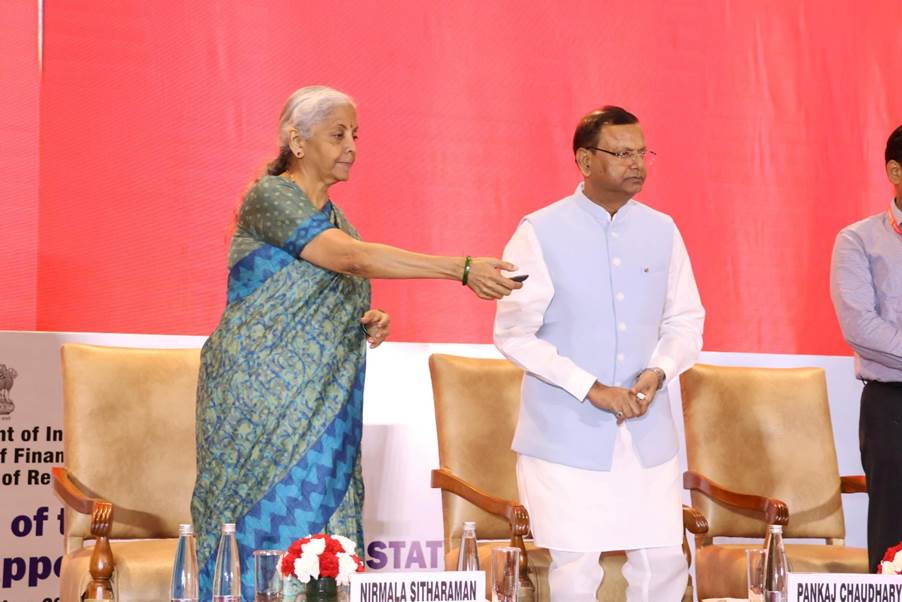
The launch of GSTAT marks a major milestone in the evolution of the Goods and Services Tax regime and strengthens the institutional framework for indirect tax dispute resolution in the country.
The launch was also attended by Union Minister of State for Finance Shri Pankaj Chaudhary; President of GSTAT, Justice Shri Sanjaya Kumar Mishra: Minister from the State of Haryana Shri Rao Narbir Singh, senior officers from the Department of Revenue, officers from State and Central GST formations, eminent members of the legal fraternity, and representatives from trade and industry.
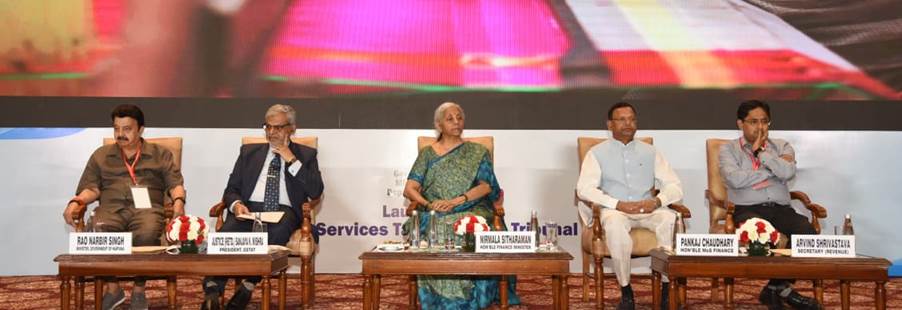
In her address, the Union Finance Minister called the launch of Goods and Services Tax Appellate Tribunal (GSTAT) not just an institutional milestone — it is a symbol of how far GST has come in the last eight years, and it is also a powerful reminder of our determination to continue improving, reforming, and adapting it for the future.
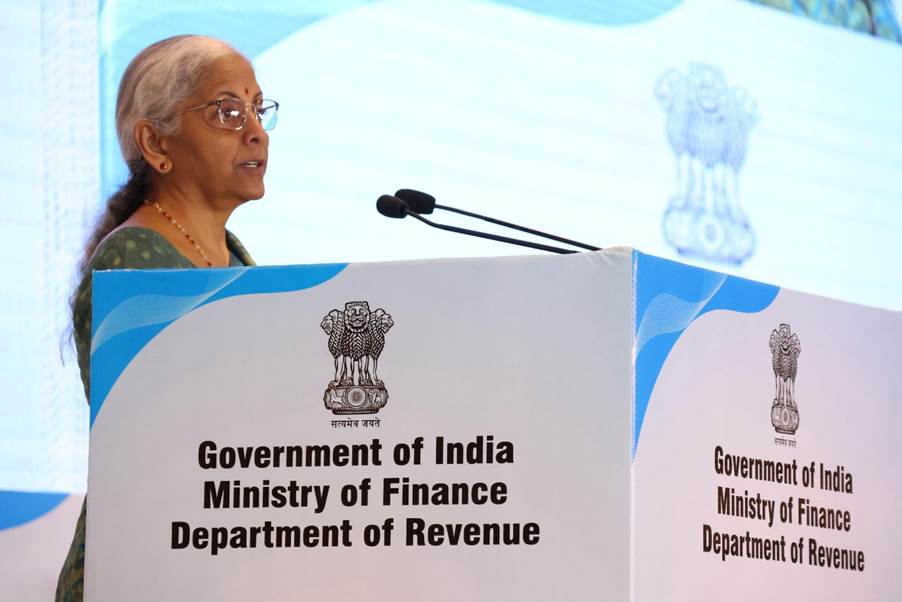
The guiding idea behind introducing GST was unity - 'unity in policy’, ‘unity in compliance’, and ‘unity in economic purpose’, She added.
Since its launch, the GST Council, working with States and Union Territories, has refined and strengthened the system. GST has grown as a reliable revenue source, widened the tax base, encouraged formalisation and become a foundation of India’s growth story, the Union Finance Minister said.
Smt. Sitharaman underlined that reform is a continuous process and GST must evolve and it is evolving around the principle of simplicity and ease of living.
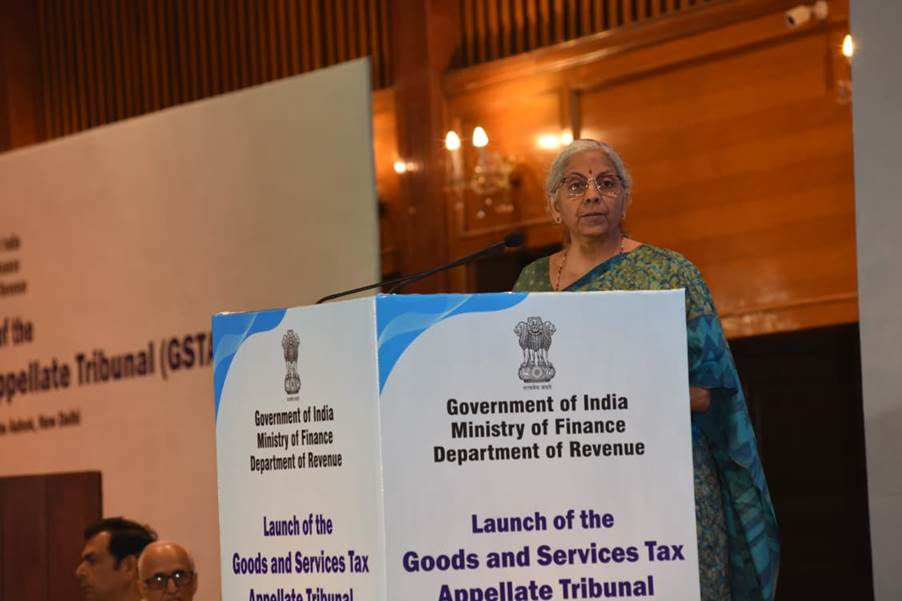
The Union Finance Minister stated that from the ramparts of the Red Fort, the Prime Minister, Shri Narendra Modi, had announced the Next Generation of GST Reforms. Guided by 'Nagarik Devo Bhava', we are moving with a citizen-first lens that values time, clarity and savings. Next-Gen GST is delivering exactly that and the outcome this festive season, is a nationwide GST Bachat Utsav across sectors and everyday life, She added.
In the spirit of 'Nagarik Devo Bhava', Smt. Sitharaman said that our focus for GSTAT must be clear:
- Jargon-free decisions in plain language, simplified formats and checklists, digital-by-default filings and virtual hearings, and time standards for listing, hearing and pronouncement.
- The outcome we seek is straightforward: reduced legal frictions, greater simplicity, and delays in litigation addressed proactively, so cash flows move faster, MSMEs and exporters invest with confidence and citizens feel the benefits of the system.
The Union Finance Minister said that ease of living for taxpayers extends beyond filing and refunds — it includes fair, efficient dispute resolution.
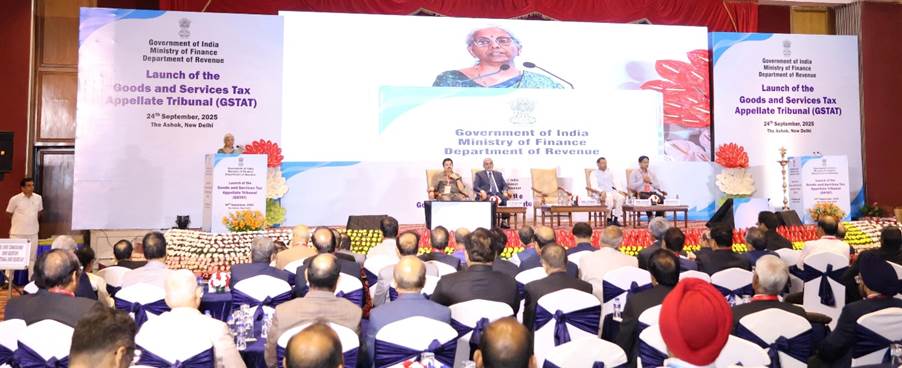
Smt. Sitharaman stated that GSTAT is a natural extension of the reform arc — an important advance for ease of doing business and a vital forum for justice; and in simple terms: when a taxpayer has a dispute, the first appeal lies within the tax administration. At the second level, whether the original order is from the Centre or a State, the appeal will now converge at a single, independent forum - the GSTAT.
Marking the operationalisation of GSTAT is an important milestone, the Union Finance Minister said that what began in 2017 as 'One Nation, One Tax, One Market' now evolves into 'One Nation, One Forum for Fairness and Certainty'.
In his address on the occasion, Shri Pankaj Chaudhary stated that this is not merely a capitalization of a new system, but it aims to deepen those reforms that have received continuous support from the honourable Prime Minister, Shri Narendra Modi. The purpose of these reforms is to make governance more transparent, empower citizens, and strengthen businesses.
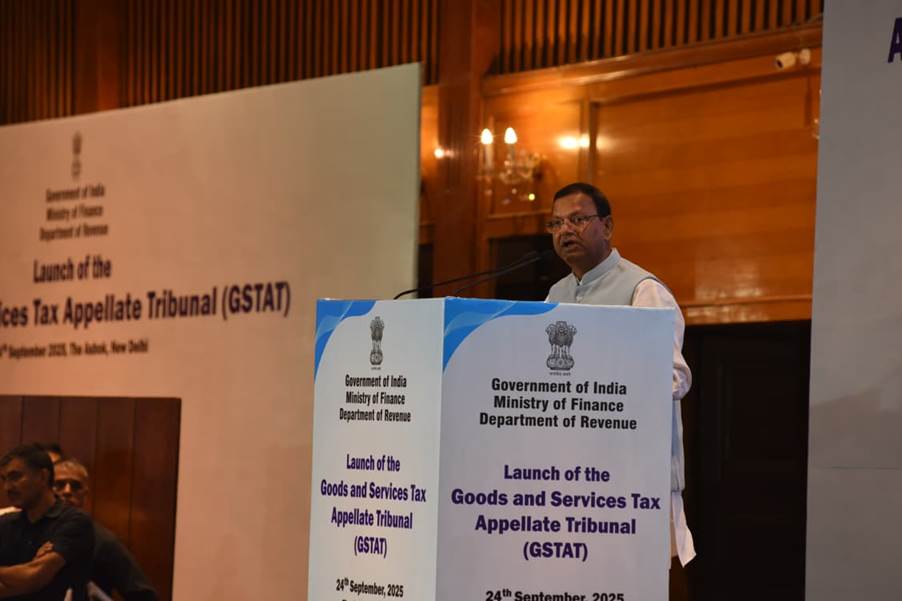
The Union Minister of State said that over the past several years, the government has made efforts to enhance the system, making it simpler, fairer, and more technology-driven. Inspired by the Prime Minister's 'Minimum Government, Maximum Governance,' we have moved towards clarity with targeted initiatives. Technology has been at the centre of this journey. Digital systems like return filing, e-invoicing, and online refunds have not only reduced the burden on taxpayers but have also strengthened trust between the government and the public.
The launch of the GST Appellate Tribunal is a significant step in this journey so that the resolution of disputes can be simple and accessible. It will provide a uniform, transparent, and reliable platform for the resolution of disputes. It will reduce ambiguity, bring uniformity across the country, and ensure that both large and small taxpayers do not have to wait long for justice. More importantly, this improvement is not just related to numbers or processes. It concerns the public. For the common citizen, GST means easy taxation and reasonable prices. For small businesses, it means less paperwork and more time to focus on growth. For startups and entrepreneurs, it signifies the freedom to dream big without being hindered by complex tax structures. And for our economy as a whole, its impact is significant, Shri Chaudhary said.
The Union Minister of state underlined that a strong appellate mechanism instils this trust that justice will be swift and fair. It assures both large and small businesses that they will not be caught in endless litigations. It makes it clear to investors that India is not only a large market but also a reliable and fair market. The most important thing is that it strengthens the trust between citizens and the government. Today, India is seen as an emerging economic power in the entire world. This confidence has been built on the reforms we have undertaken in recent years.
With the introduction of the GST Appellate Mechanism, Shri Chaudhary said, we assure every taxpayer that your appeal will be heard, your rights will be protected, and there will be no delay in justice. In this way, we make GST not just a good and simple tax, but also a fair and trustworthy tax system for the new India. The role of the GST Council and its honourable members have been extremely important in shaping these reforms and providing guidance for them. The Council has worked with the spirit of cooperative federalism so that GST can emerge as a system that balances national priorities and the needs of states and citizens, the Union Minister of State said.
The operation of the GST Appellate Tribunal is another step in this direction, and Shri Chaudhary wished all stakeholders his best wishes and commended everyone working hard to realise this institution. On reaching this milestone, it is necessary that the team continues this institution in the spirit of cooperation, Shri Chaudhary added.
In his address on the occasion, Justice Sanjaya Kumar Mishra underlined the pivotal role the Tribunal will play in clearing the significant backlog of appeals under GST while also laying down jurisprudence for future disputes. He also underscored that the cooperation of both Central and State Governments has been instrumental in enabling the timely establishment of the Tribunal and expressed confidence that such support will continue in the future.
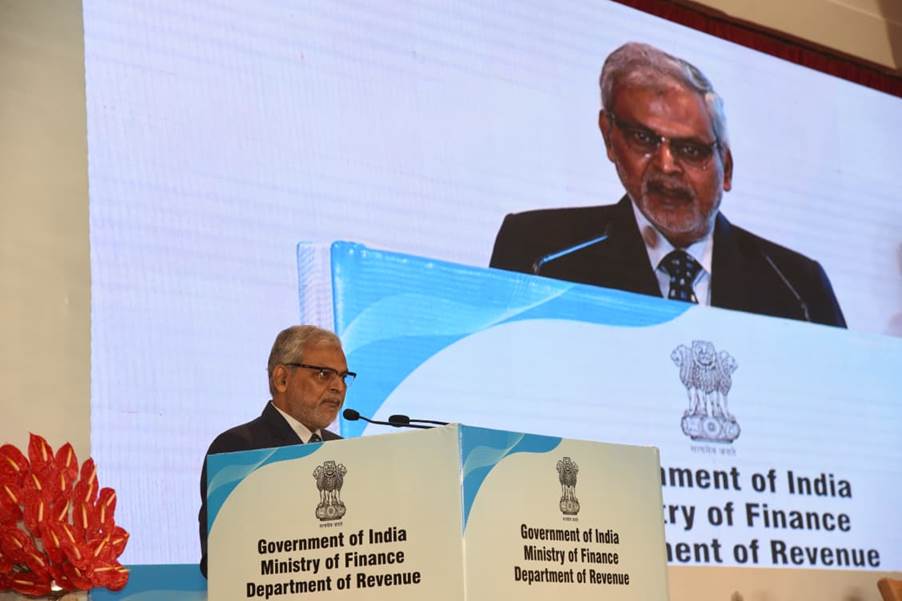
In his address on the occasion, Shri Arvind Shrivastava said that GSTAT comes at a critical juncture in the journey of GST. Shri Shrivastava said that a formal appellate body will allow equal opportunity to all sides to present their standpoint and hopefully enable settlement of such issues in a fair and stable manner.
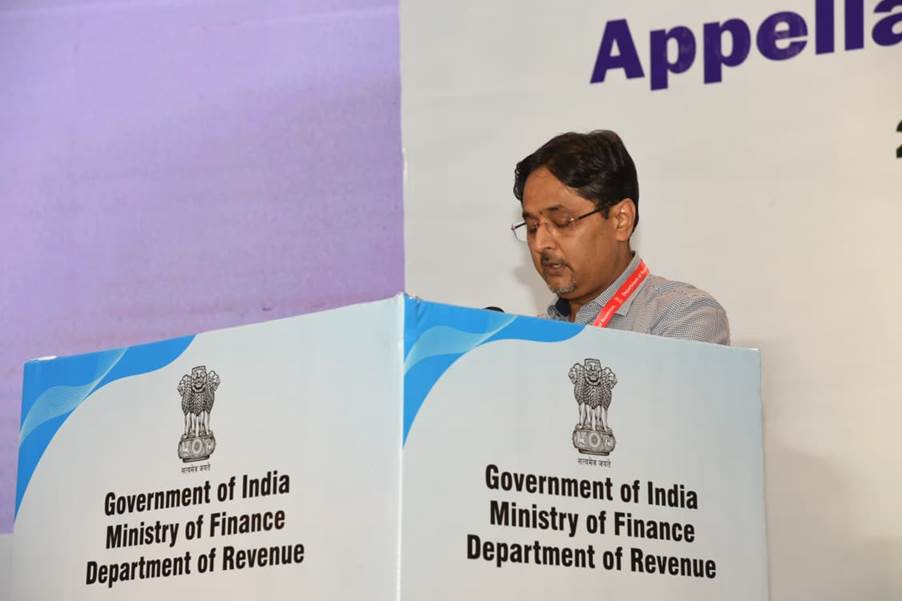
The Tribunal will provide a specialised, nationwide forum that can bring consistency in interpretation, predictability in outcomes, and credibility to the appellate process. This is vital for strengthening trust between taxpayers and tax administration, the Revenue Secretary underlined.
Highlighting the three core dimensions in the design of the GSTAT, the Revenue Secretary emphasised on the 3 S’s: structure, scale, and synergy. Its structure combines judicial and technical expertise to deliver balanced decisions. Its scale, with state benches and the possibility of single-member benches for simpler matters, ensures reach and efficiency. And its synergy — between technology, process, and human expertise — will allow it to deliver justice with both speed and depth.
Concluding his remarks, Shri Shrivastava said that the Department of Revenue, in partnership with GSTN and NIC, has developed a digital platform that will anchor the work of GSTAT from the very start. e-Filing, case management tools, and electronic court modules will make proceedings smoother and more transparent, setting new benchmarks for the functioning of a Tribunal in our country.
A vote of thanks on the occasion was given by Shri Balasubramanian Krishnamurthy, Joint Secretary, Department of Revenue, Ministry of Finance.

A key feature unveiled during the launch was the GSTAT e-Courts Portal, developed by Goods and Services Tax Network (GSTN) in collaboration with National Informatics Centre (NIC). This digital platform will enable taxpayers and practitioners to file appeals online, track the progress of cases, and participate in hearings through digital mode. The portal is expected to enhance the efficiency and productivity of GSTAT, building on the success of NIC’s e-courts modules already operational in other tribunals under the Department of Revenue. To enable a smooth and convenient filing experience for taxpayers, GSTAT has allowed staggered filing of appeals up to 30th June 2026. This measure ensures that taxpayers, trade bodies, and advisors have adequate time to prepare and submit their appeals in an orderly manner, without procedural bottlenecks. Comprehensive guidance has also been provided to support users including FAQs, explanatory notes, and instructional videos available on the GSTAT Portal (https://efiling.gstat.gov.in). This covers aspects of registration, filing of appeals, digital hearings, and case tracking. These resources are aimed at ensuring that all stakeholders, including MSMEs and individual taxpayers, can easily access and benefit from the Tribunal’s services.
The launch of GSTAT is a significant step in the continuing evolution of India’s indirect tax system. It will provide taxpayers with a specialized forum to seek justice and will bring greater orderliness, predictability, and credibility to the GST regime. The Tribunal is envisaged as a cornerstone institution in ensuring that India’s tax administration remains responsive, transparent, and aligned with the principles of ease of doing business.
About GSTAT
The Goods and Services Tax Appellate Tribunal (GSTAT) is a statutory appellate body established under the Goods and Services Tax laws. It has been constituted to hear appeals against orders passed by the GST Appellate Authorities and to provide taxpayers with an independent forum for justice. The Tribunal will function through a Principal Bench in New Delhi and 31 State Benches across 45 locations in India, thereby ensuring accessibility and nationwide reach.
Each Bench of the GSTAT will comprise two Judicial Members, one Technical Member (Centre), and one Technical Member (State), ensuring a balanced composition of judicial expertise and technical knowledge from both Central and State administrations. This structure reflects the spirit of cooperative federalism and is designed to deliver impartial and consistent decisions.
****
NB/KMN
(Release ID: 2170932)
Visitor Counter : 12178